- From Faith Current: “The Sacred Ordinary: St. Peter’s Church Hall” - May 1, 2023
- A brief (?) hiatus - April 22, 2023
- Something Happened - March 6, 2023
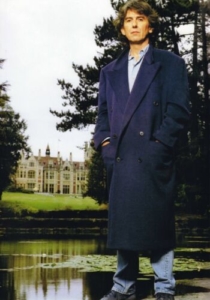 Reader David wrote me to ask:
Reader David wrote me to ask:
“Some thoughts I’ve had recently with George Harrison‘s behavior within the Beatles particularly when the true Beatlemania kicked in. Do you think that kind of insanity going on around him, the crush of the crowds, the screaming, being chased and attacked…could all of that made him feel threatened, vulnerable, perhaps that his life was in danger? Ringo is on record talking about loving the experience. Paul certainly seemed to love it…John eventually I think stopped caring for it though he wasn’t a deer in headlights over it. George on the other hand, if you look at what he sought out in life, and how he lived his life in the post Beatle years…could his Beatle experience left him with legit PTSD that was just never diagnosed?”
David, I’m not in the mental health field, but do have some experience with PTSD—what causes it, how it feels, how you get rid of it. There are two questions here, both interesting to me.
- Ironic as it may seem, is it possible or perhaps even likely, that the physical/psychological experience of Beatlemania was trauma-inducing to the objects of the world’s affection?
- Was George Harrison in particular traumatized by it?
I think the answer to #1 is definitely, yes. Think about how hearing a scream makes you feel: on high alert. Now multiply that by 50,000. Even if it all merged into white noise, that’s still exposure to massive noise, over and over, for years on end. Exposure to loud noise has been linked to all sorts of malign psychological effects, some of which sound like George in his dour moods.
But noise wasn’t the only factor of Beatlemania—there were also the jelly babies. You laugh, but I can imagine a near-constant flinch reaction from that. And people were acting crazy—tearing at the Beatles, tearing at themselves. What would they do if they caught a Beatle? J/P/G/R didn’t know, because the fans themselves didn’t know. At every concert, there was a very real possibility of being torn to pieces, and the security and other distancing aspects of the experience were very rudimentary. And there was no relief; people were constantly trying to sneak into their suite, backstage, even onstage.
I’m going to say something somewhat controversial, but to me Lennon’s demise, and Harrison’s near-demise, are an entirely predictable, logical, perhaps even inevitable Act Two to what happened to them from 1962-66. And I think all four of them were very aware of this possibility, even as young men, even if we fans weren’t.
Even factoring in the resiliency of youth, I think you’d have to be more than human to avoid severe nervous system effects from Beatlemania. I think all of them were definitely traumatized by it, in proportion to their own neurological tendencies. After 1964, the band’s drug use strikes me as less volitional—less “let’s have fun!”—and more of an increasingly strong adaptation to ongoing Beatlemania. Using stronger and stronger chemicals to forcibly detune their nervous systems, and detach from reality.
So the second question: was George traumatized? I think he certainly was, not least because it seems he felt he was. George famously said, “[The fans] gave their money and they gave their screams, but the Beatles kind of gave their nervous systems.” George seems to have liked the money and power and ability to travel and nice things; it was the attention he didn’t like. The imposition. The craziness. He must’ve looked at someone like Jeff Lynne with envy; famous, wealthy, successful—but not so much so he was hunted.
Not for nothing George became fascinated by one of the few corners of the world, India, where he could travel about freely without being mobbed. And just as John chose Yoko, someone who actively disdained Beatle-worship, George’s gurus neither knew nor cared about his status as a Beatle. John and George especially seemed to seek out those who weren’t infected with the happy madness…a condition that to them, must’ve looked like plain old madness. John holed
Of the four, George was the most publicly averse to the experience of mega-celebrity, even before the attempt on his life. Of the four, George is the one who seems to like the fans the least, and resent them the most—in public at least. But George doesn’t seem to be hateful in general; he actually seems to have a lot of friends, maybe the most of the four, and seems to be really congenial with them…just not to strangers who want stuff from him. Contrast this to Paul, who always has time for a fan, but—I’ve never heard anyone being called, “Paul McCartney’s close friend.”
As I’ve gotten older, longed for more peace and quiet, and had several brushes with celebrity, all of which have made me shiver, the destructive impact of Beatlemania as a lived experience has become sharper and sharper to me. I don’t think you can understand the Beatles story without very deep thought, empathetic rumination, on this issue. Thanks for the question. Hope everybody is well.

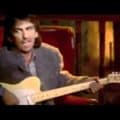
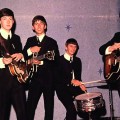
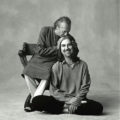
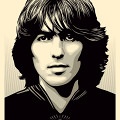
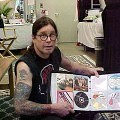
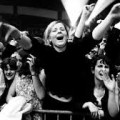

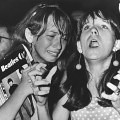
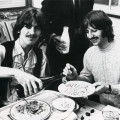
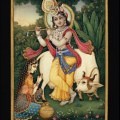
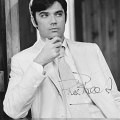
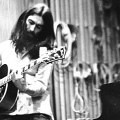
I found this article particularly interesting as it reminded me of something that might have been a factor in George’s discomfort with live performances. Everyone has their own tolerance and threshold for noise and can be stressed in any number of ways, some quite adversely, by it.
When one says “the concerts were as loud as a jet taking off” it makes me think that some Beatles concerts could have been worse/louder and here I speak from experience. As a military, and then airline, pilot I was always very careful with my hearing, but I have heard my share of the sound levels a jet can produce and found that many aircraft (think Concorde with its four Olympus engines in afterburner) were of a lower frequency than a concert. In other words, jet noise can indeed be unpleasant, but maybe not nearly as uncomfortable as what thirty minutes or more of higher frequency screaming might have been like. If George were one of those individuals who, while perhaps not even realizing it, was more deeply susceptible to this noise stress, I can readily understand how the fun and novelty of live performances would quickly wear thin.
I have never heard this discussed as we always imagine those in the audience are the ones being blasted with the loudest noises. In George’s case however, it could have been in reverse and it was he, being on stage, who was subject to an earful of unpleasant, and very painful, high-frequency noise/screaming. We know the others grew weary of it, but George might have physically and auditorily not been able to tolerate it as well as John, Paul, and Ringo.
Perhaps this is but a small point, but I think @Michael touched on something that could be a direct, but easily overlooked, factor in George’s disillusionment in touring.
Thank you for taking the time to respond!
This also may have started relatively early for George in a way. I remember hearing that some letters of his to Astrid were auctioned off…and in it he asks not to send her response to an address different from where he was staying…because he didn’t want fans to know where he lived. So even back then, 1962 ish, he was already taking steps to distance himself from the very beginnings of the craziness
Of course, @Dave.
I have wondered whether George was what psychologists call a “highly sensitive person.” But my initial poke-around didn’t reveal much.
I’d like to add that seeing Harrison’s experience of the Beatles’ fame as traumatic makes sense as he appears to be the most introverted member of the band. Being the focus of that much intense public attention, which expressed itself in such powerful ways, had to be particularly hard for him to manage.
I notice in the early Beatles interviews, in Britain at least, George being just as talkative as the others, more so than Ringo, and quite often more than Paul, who has the reputation of being the diplomatic one. In the early concert footage, they all appeared to incite screaming from fans. George with his little dance steps, Paul and Ringo in shaking their moptops, and John with his suggestive stance behind the microphone. George seemed to withdraw when more attention was given to John and Paul as songwriters, perhaps also because of their personalities. Perhaps then, Beatlemania and its trappings no longer seemed worth the effort. I’m not sure just how introverted George really was. I get the impression that he had low tolerance, and when he couldn’t be bothered with something, he couldn’t be bothered. A boy who turned up to school wearing blue suede shoes and drainpipe trousers, was often stubborn and rebellious, doesn’t strike me as an overly introverted person, but almost attention-seeking. Taciturn and distant, certainly. It’s interesting how fans and the media have moulded their images and characters. George always said it was Paul who was the shy one, not him, and self-conscious (which he is). Introversion and shyness don’t necessarily go hand-in-hand of course, one doesn’t need to be shy to be introverted, or vice versa, but I very much doubt George and Paul represented opposite ends of the spectrum, particularly when so many people say that Paul holds back and is hard to get to know. Of all the relationships, George and Paul’s seemed the most complicated.
I also get the impression that Paul was the introverted one. Even today, when people say that his responses during interviews appear scripted, they probably are. To me that indicates a reluctance to open up, or fear of revealing anything. As for George, the title Quiet One has to be one of those ironic nicknames, such as Tiny for a huge guy or Gabby for a shy person. The guy literally couldn’t stop talking in all the Beatles programs I’ve listened to, to the point of droning. He was very philosophical and you know how verbose those guys can be. As an aside, George probably had the heaviest Scouse accent of the four. My mom thinks Paul sounded the most American compared to the others.
I’d say Paul is both extroverted and guarded. I recall reading about a study of people who lost a parent in their early teens, and being guarded was found to be a common denominator. Or maybe he was just made that way.
He also seems to be the most self-conscious of the Fabs, but it’s hard to say if there’s a correlation among these traits… not to mention shyness and noise tolerance!
I’ve always thought it was odd that George’s scouse accent was thicker than Ringo’s, but it occurs to me that Ringo spending a lot of time in hospital exposed him to a wide range of accents at a young age.
We’ve said on the site for a million years that Paul’s friendliness was clearly a strategy so that he would reveal only what he wanted to reveal, and nothing that he didn’t. Paul strives to make friends with the Press; to give them access and charm them. Similarly, John’s pose of “confrontational honesty” allowed him to stay in control and do the same thing. John strove to give the Press something juicy so as not to talk about other things.
Paul’s strategy is a very old-fashioned one, whereas John’s is much more in the style of postwar New Showbiz; cf. Marlon Brando.
Both strategies are based in personality–you pick the approach that’s most comfortable for you–but both have at bottom a desire to control an insatiable press by giving them something, so you don’t have to give them anything you don’t want to give. This was necessary from the very beginning of the fame. The downside of Paul’s strategy is a persistent sense that he’s “too nice” — ie, not sincere, and rather boring. You see this in comments here regularly. And the downside of John’s strategy was that people sense a certain hypocrisy.
In the end, I suspect that each was more like the other than we realize.
I’m sensing some “John vs Paul” coming on, so comments are closed. Thanks everybody!
Just want to sneak in here and say that, as a self-identified introvert, introversion doesn’t equate to shyness or discomfort with public speaking/performance. It’s more about what people need to recharge: time with people, or time alone. My sense is that George flourished with some time alone, and that’s one reason he was more drawn to meditation and more comfortable in Rishikesh than the other Beatles.